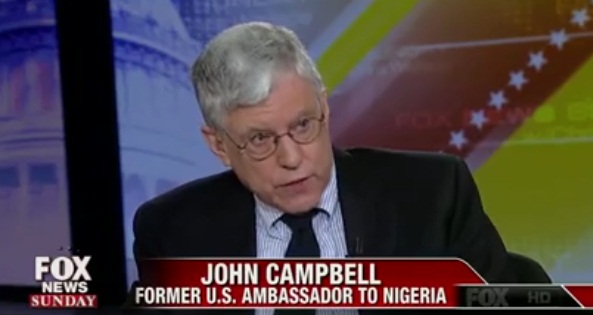Former US ambassador to Nigeria, John Campbell has said the United States is not seeking the disintegration of Nigeria as some conspiracy theorists have alleged.
He made the statement in an interview with Punch Newspapers in response to a question on his book, Nigeria: Dancing on the Brink.
Excerpts:
In your critically acclaimed book, Nigeria: Dancing on the Brink, you talked about Nigeria exhibiting symptoms of a failing/fragile state. Has your view changed?
My view has not changed about the serious challenges Nigeria faces. I think the challenges are more pronounced than they were before the Boko Haram insurrection began in the North. Political life is also unsettled by the approach of the 2015 elections. The ruling party has not yet presented a candidate. But most observers expect that the president will seek re-election. As for the opposition party, there does not seem to be a consensus presidential candidate.
Will you say things have gone from bad to worse since you wrote that book?
The challenges Nigeria faces at the moment are considerable and differ somewhat from four years ago when I wrote the book.
Considering what you wrote in your book four years ago, if you were to revise it again, what will you add about Nigeria?
I would pay more attention to the problems of corruption. It is mind-boggling how millions of dollars go missing. Take for instance, the serious allegation made by the former Central Bank of Nigeria Governor, Lamido Sanusi. He has claimed that an amount he variously estimated at $10 billion, $20 billion and $50 billion is unaccounted for. The Finance Minister has called for an audit, but I do not believe the results have yet been made public.
There are different types of corruption in Nigeria. For example, there is petty corruption. Nigerian policemen are poorly paid. At a checkpoint you hear a policeman saying ‘Do you have anything for me today?’ Because they are poorly paid, it will be difficult for them to keep their families without the ‘bribes’ they levy to let people pass through their checkpoints. Another instance is where a civil servant insists on being paid to perform a service which is supposed to be free of charge. This type of corruption will be very difficult to deal with because it will require a massive restructuring of salaries paid to public servants. But, then there is the corruption where millions of dollar go missing through rigging of contracts, money laundering or oil bunkering.
Many see your book as a doomsday prediction for Nigeria. What exactly was the focus of the book?
In my book, the focus was to tell the American people how vastly important the country Nigeria is to America. I should add that a few Nigerians who see it as a prediction of the collapse of their country are mistaken. It is a warning, however, that Nigeria’s challenges must be addressed. Nigeria faces huge challenges. The confluence of Boko Haram, upcoming 2015 elections and the epidemic of ethnic clashes leave it as it were ‘dancing on the brink.’
Did you point to 2015 in your book?
So far I can recall, I did not point to 2015. There is an ‘urban legend’ in circulation among some Nigerians that, somehow, the United States wants to see Nigeria break apart. Nothing could be further from the truth. US policy consistently has been to support the unity of Nigeria. My own warnings about the challenges Nigeria faces have also been taken by some as somehow promoting Nigeria’s breakup. As a person who knows Nigeria well, I can imagine no greater disaster.
It doesn’t appear the Federal Government is happy about the Boko Haram situation but many Nigerians feel it is not doing enough. What more do you think the government can do?
The Boko Haram insurgency is complex and diffuse. Boko Haram does not appear to be a conventional political struggle. Shekau does not speak in conventional political terms in his videos. So far as I am aware, he never refers to “economic development.” There are also splinter groups, such as Ansaru. Therefore, the government will need to follow a multi-pronged strategy. I think the Federal Government should go back and look at the recommendation by the National Security Adviser, Sambo Dasuki, in April. These are well-thought out long-term solutions. If the government carefully follows through, this could be an effective approach to the insurgency.
It seems, at the moment, the Nigerian government isn’t looking at the Dasuki recommendation. What does this portend and what are some of the points of the recommendation?
The former national security adviser’s proposals are well-thought out and long-term in scope. They would also require a significant diversion of government spending. They likely will require a long time to implement. What disappoints me is that there is no sign that preparatory work is being done, and Dasuki’s recommendations seem to have largely disappeared from public discourse. It is possible, of course, that government’s preparation is going forward. If so, I wish the Jonathan administration would publicise what it is doing.



Leave a Reply